Book contents
- Frontmatter
- Contents
- Illustrations
- Preface
- Abbreviations
- PART I The poetry of an aristocratic warrior society
- PART II The poetry of a universal religion
- 7 Vernacular poetic narrative in a Christian world
- 8 Poet, public petitioner and preacher
- 9 Symbolic language serving the company of Christ
- 10 Adaptation to a new material morality
- 11 From social hero to individual sub specie aeternitatis
- 12 Loyalty as a responsibility of the individual
- 13 This world as part of God's spiritual dominion
- Works cited
- Index I Quotations of two or more ‘lines’ of Old English poetry
- Index II A representative selection of the symbols and word pairs cited in discussion
- Index III General
7 - Vernacular poetic narrative in a Christian world
Published online by Cambridge University Press: 18 December 2009
- Frontmatter
- Contents
- Illustrations
- Preface
- Abbreviations
- PART I The poetry of an aristocratic warrior society
- PART II The poetry of a universal religion
- 7 Vernacular poetic narrative in a Christian world
- 8 Poet, public petitioner and preacher
- 9 Symbolic language serving the company of Christ
- 10 Adaptation to a new material morality
- 11 From social hero to individual sub specie aeternitatis
- 12 Loyalty as a responsibility of the individual
- 13 This world as part of God's spiritual dominion
- Works cited
- Index I Quotations of two or more ‘lines’ of Old English poetry
- Index II A representative selection of the symbols and word pairs cited in discussion
- Index III General
Summary
The process of cultural change which was initiated by the coming of Christianity affected the Anglo-Saxons' tradition of socially based poetry in all its departments. The ideas, mode, language and transmission of vernacular verse were all subject irrevocably to radical alteration. Narrative thought still prevailed, but was basically reorientated. The arena of action was reconceived and peopled by new relationship: a spiritual Christ-centred world enveloped the earthly environs of social concerns. The communities which previously had been defined in terms of human kingship and its related institutions became subsumed into the rule of Christ, lord over all creation for ever, the son begotten true God from true God before time began, the being through whom sky, earth and sea and their inhabitants were created bearing the divine imprint, the incarnated redeemer of lapsed mankind, adored in heaven and praised on earth, the promised judge ahead. The perspectives of human life – its lines of communication, its morality, its conceptions of individuality, its loyalties – all underwent permanent transmutation. The environment was rearranged. Verticality took on a greater prominance in surroundings which had a heaven above and a hell beneath than it had had before in horizontal continuous time: the old Germanic term middangeard, ‘middle dwelling’, began to signify the region between heaven and hell rather than the inhabited land surrounded by sea.
- Type
- Chapter
- Information
- Interactions of Thought and Language in Old English Poetry , pp. 229 - 272Publisher: Cambridge University PressPrint publication year: 1995

